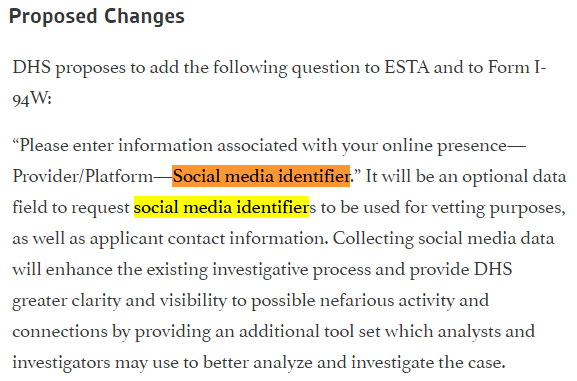The original DHS proposal, published in June, requests to add an “optional” question to both ETSA and I-94/I-94W forms asking visitors to the United States to add their social media handle information to be used for “vetting purposes.” The agency claims the process would aid law enforcement officials as a visa-waiver screening mechanism for aliens seeking entry under the nonimmigrant Visa Waiver Program and the Electronic System for Travel Authorization.
"Please enter information associated with your online presence -- Provider/Platform -- Social media identifier" is the proposed wording of the request.

Department of Homeland Security: ESTA and I-94 form changes proposal (via FederalRegister.gov)
Internet Association, CDT and others scrutinize proposal in comments
Of course, Silicon Valley is composed of many foreign and once-foreign nationals who have either obtained citizenship status, currently live with immigrant or non-immigrant visas, or simply have family members who frequently travel under these conditions to and from the region. Regardless, several large technology giants in the region, mostly Internet companies, formed a group called the Internet Association dedicated to lobbying any politically sensitive legislation deemed harmful to Internet freedoms, privacy and entrepreneurship, etc. The group is composed of companies including Google, Facebook, Twitter, Snapchat, eBay, Yahoo, Uber, Netflix, PayPal, LinkedIn and many others.
The Internet Association and the Center for Democracy and Technology – another non-profit open Internet group – issued objections to the agency’s proposal during a 60-day period for public comments that ended on August 22nd. The CDT’s full letter can be found here.
“If enacted, social media collection by CBP will invade individual privacy, burden free expression, and expose particular communities to the risk of undue surveillance or ideological exclusion,” says a blog post from the CDT.
"Should the U.S. Government advance with the DHS proposal it is probable that other countries will make similar requests of visitors entering their country, including U.S. citizens," the companies wrote in comments to the agency.
Of course, the decision to enter the information is entirely voluntary. But some visitors will likely fill out the form completely in order to avoid risking “additional questions from intimidating, uninformed officers — the same officers who will decide which of your jokes are funny and which ones make you a security risk,” said Nathan White, Senior Legislative Manager at Access Now.
According to the DHS, '[c]ollecting social media data will enhance the existing investigative process and provide DHS greater clarity and visibility to possible nefarious activity and connections by providing an additional tool set which analysts and investigators may use to better analyze and investigate the case.'
Still, some analysts object that collecting social identifier information is likely only to identify criminal targets who conscientiously post objectionable or suspicious comments prior to entering a foreign country, rather than those premeditating attacks without an online social presence.
As for the civil society groups involved in public comments, some of them have criticized the proposed method of social media vetting, claiming it “will fall hardest on Arab and Muslim communities, whose usernames, posts, contacts, and social networks will be exposed to intense scrutiny.”



